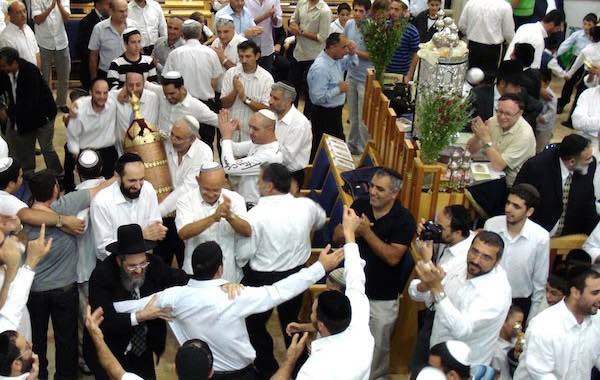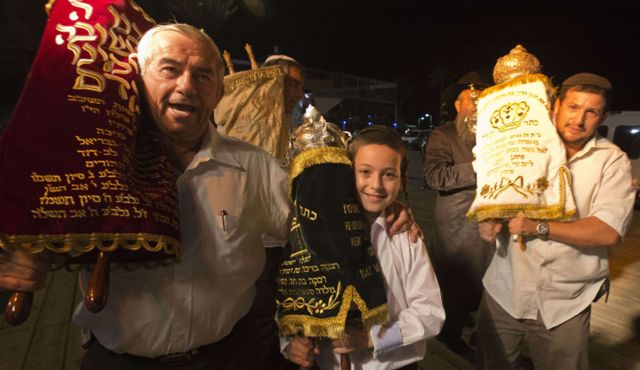The festival of Sukkot comes to an end on the seventh day, “Hoshanah Rabba,” or “The Great Salvation,” the greatest day of the feast (Friday, Oct. 9, 2020). Then there is The Eighth Day (Saturday, Oct. 10, 2020). The Eighth Day, counting from the first day of Sukkot, is considered a special celebration day of its own. It is to be a Sabbath Day, meaning a day of rest and a day of celebration. This year the Eighth Day just so happens to fall on the regular Sabbath day. It is also a day to assemble together and rejoice before the LORD (Lev. 23:36, 39).
This Eighth Day is the time when the Jewish people leave the “sukkah” (booth or tabernacle) and observe a unique day of transition. The Eighth Day marks the official end of summer and the beginning of fall, with the expectation of the fall and winter rains. Prayers are now recited to request the blessing of rain upon the land. There is generally no rainfall in Israel for seven months, from Passover until the end of Sukkot (from April until October). However from The Eighth Day until the coming Passover, the nation of Israel anticipates the rains from heaven and there are daily prayers offered to the God of heaven and earth to bless the Land with rain.
The Eighth Day is also the official end of the Torah reading cycle for the year. To mark this unique day there is a special celebration, which in Hebrew is called “שמחת תורה” – Simchat Torah or “The Joy of the Torah!”
During this festive ceremony of Simchat Torah there is rejoicing with the Torah in a very tangible way. It is customary at the synagogue to march or dance seven circuits around the synagogue as attendees take turns holding and literally dancing with a Torah scroll.

On this day there is a special ceremony inside the synagogue in which two male members of the synagogue are called upon to perform transitional readings for the year. As the Jewish people consider themselves married to the Torah (the Law of God), these two men are considered grooms: one being the Chatan Torah (groom of the Torah) and the other being the Chatan Beresheit (groom of Genesis).
In the reading of the Torah Portion for the Eighth Day, the Chatan Torah reads the final verses of Deuteronomy then the Chatan Beresheit reads the first few portion of Genesis, including the six days of creation and the first Sabbath Day. In this way the Jewish reading cycle is completed and then continues on as the new Torah reading begins again for another year starting with Genesis.
Immediately following the reading of the last verse in Deuteronomy by the Chatan Torah and immediately before the Chatan Beresheit begins to read the first verses in Genesis, everyone in the synagogue shouts aloud in unison, “חזק חזק ונתחזק” – Chazak, Chazak, ve Nitchazek – “Be Strong, Be Strong, and let us strengthen one another!”
Both The Eighth Day and Simchat Torah are good reminders for us all to continually read the word of God, to constantly rely on God for our daily needs, and to encourage one another daily in the LORD. Let us be strong in the LORD and strengthen one another in our faith!
The final Torah Portion of the year, Deut. 33 & Deut. 34, is read on the Eighth Day. To read this week’s commentary on the final Torah Portion, please click this link: Obtaining the Blessing!
Chag Sameach!
If you enjoyed reading this article, we invite you to sign up for our weekly Torah Portion commentary on the sidebar to the right.
Help keep our weekly commentaries free and available to all. Click here to donate today:
Copyright Jewels of Judaism. All rights reserved 2020





How can 22 in Tishrei be the eighth day if people are boothmakets on 15 in Tishrei?
Sukkot is for seven days, 15-21 of Tishri, and then there is the eighth day on the 22nd of Tishri (Lev. 23).
Interesting explanation of the meaning about this eighth day. Important to pray for rain, and I would like to say “abundant spiritual rain for all” also!
“Be Strong, Be Strong, and let us strengthen one another!” -Amin!
Thank you Daniel.